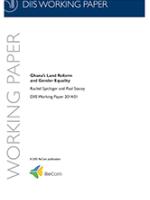Gender Equality Concerns in Ghana's Land Reform
In 1999, Ghana engaged in an ambitious land reform process with the adoption of a National Land Policy – implemented through a Land Administration Project, and supported by the World Bank and several other donors.
The reform aims at strengthening land administration institutions and increasing the security of land tenure for landholders on both customary and state land, but the process is facing multiple challenges
Registration of property still causes problems
While some success in land registration has been recorded in some pilot areas, a lot of issues remain, and defining and registering property has proven challenging, for many reasons. There are for instance numerous instances of multiple sales and overlapping claims, at community but also individual level.
Malfunctioning agencies and institutions
Research has shown that the implementation of the reform is also hampered by the malfunctioning of land sector agencies, as well as the overlapping and conflicting role of the different land management institutions.
Moreover, vesting agency in customary authorities, while being seen as a positive element of the reform, has also brought about important problems. Although at first not focusing on women’s land rights, the Land Administration Project tackled gender issues by developing a gender strategy to mainstream gender in activities and policies.
Cultural practices, social and economic status hinder women's access to land
Indeed, several authors agree that despite a progressive legal framework in relation to inheritance, customary and cultural practices which are discriminatory remain the norm: women rarely have ownership of land, and gain access to land often through a male relative, for social, cultural and economic reasons."
Assessments of the reform’s implementation have also pointed out that women may also experience discrimination through the implementation process itself: expensive registration processes may prevent many women from having their land registered, and women may not be able to access institutions responsible for land administration.
Donor support and women’s access to authorities
Issues related to access to institutions and to law enforcement agencies are also central to women’s ability to gain or re-gain their claims to land. However, it is not clear yet how these gender issues have been mainstreamed by the reform process and agencies responsible for it, as well as in law enforcement institutions.
Examining the role of donors in relation to these issues, the paper finds that donor support is marked by significant shifts.
Donor support focused at first on titling and registration, but then also targeted the establishment or reinforcement of customary institutions. In a similar shift, gender issues, at first receiving little consideration, have increasingly been included in the reform process.
However, the paper finds that gender is still not a central preoccupation of land sector activities. It calls for more attention to be paid to the accountability of customary institutions and to the potentially excluding and alienating impact of the reform along the lines of gender, as well as ethnicity and social status.
This paper is part of a series on gender equality and land administration within the ReCom framework. It reviews the literature on Ghana’s land reform and women’s access to land in Ghana and examines the role donors have played in including gender equality concerns in the reform process.


